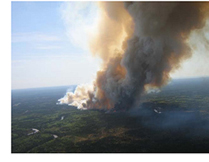This video presents “Close up of fire smoke”:

Wildland fires are an annual occurrence throughout Manitoba:
- They are caused by accidental or intentional human activity and lightning strikes.
- Though they often involve remote forested areas, wildland fires can affect communities.
- Large fires may disperse smoke over great distances.
- Occasionally, larger centers are affected.
The details of the Wildland Fire Smoke advisory for July 13 are as follows:
- Over the next few days, some Manitobans may be exposed to smoke drifting into central and northern Manitoba from a number of wildland fires that are burning in Alberta and Saskatchewan.
- Smoke levels may vary throughout the province over the weekend:
- they may be highest tomorrow in areas around Flin Flon and The Pas
- other areas may be impacted as well
Smoke from wildland fires can pose a health risk:
- Manitoba Health advises:
- People at higher risk, such as young children, the elderly and people with heart or lung conditions (particularly asthma), should take additional precautions if:
- conditions are hazy with a smoke odour
- visibility is less than eight kilometres or
- they are having symptoms
- Others may wish to avoid strenuous activity in these conditions
- If smoke is thicker, everyone may wish to consider precautions
- Exposure to smoke can cause:
- sore eyes
- tears
- coughing
- a runny nose
- People at higher risk, such as young children, the elderly and people with heart or lung conditions (particularly asthma), should take additional precautions if:
- In areas affected by smoke from wildland fires, Manitoba Health encourages residents to:
- use common sense about outdoor or strenuous physical activity
- if breathing becomes difficult or uncomfortable, stop or reduce the activity
- reduce exposure to smoke by staying indoors or moving to areas with cleaner air, as conditions can vary dramatically by area
- if an air conditioner is drawing in smoke from outside, consider reducing the external air intake, running it intermittently or turning it off
- keep indoor air cleaner by avoiding smoking or burning other materials
- use a commercially available, high-efficiency particulate-air (HEPA) filter to further improve indoor air quality near the filter
- use common sense about outdoor or strenuous physical activity
Manitobans with health questions or concerns can contact their:
- health-care provider
- or Health Links-Info Santé at 204-788-8200 or 1-888-315-9257 (toll-free).
Please click here for more info on the health effects of smoke.
Manitoba, Canada
NEWS RELEASE
July 13, 2012
WILDLAND FIRE SMOKE ADVISORY ISSUED
FOR CENTRAL, NORTHERN MANITOBA
Over the next few days, some Manitobans may be exposed to smoke drifting into central and northern Manitoba from a number of wildland fires that are burning in Alberta and Saskatchewan. Smoke levels may vary throughout the province over the weekend. They may be highest tomorrow in areas around Flin Flon and The Pas, but other areas may be impacted as well.
Manitoba Health advises that people at higher risk, such as young children, the elderly and people with heart or lung conditions (particularly asthma), should take additional precautions if conditions are hazy with a smoke odour, if visibility is less than eight kilometres or if they are having symptoms. Others may wish to avoid strenuous activity in these conditions. If smoke is thicker, everyone may wish to consider precautions. Exposure to smoke can cause sore eyes, tears, coughing and a runny nose.
In areas affected by smoke from wildland fires, Manitoba Health encourages residents to:
– use common sense about outdoor or strenuous physical activity; if breathing becomes difficult or uncomfortable, stop or reduce the activity;
– reduce exposure to smoke by staying indoors or moving to areas with cleaner air, as conditions can vary dramatically by area;
– if an air conditioner is drawing in smoke from outside, consider reducing the external air intake, running it intermittently or turning it off;
– keep indoor air cleaner by avoiding smoking or burning other materials; and
– use a commercially available, high-efficiency particulate-air (HEPA) filter to further improve indoor air quality near the filter.
Manitobans with health questions or concerns can contact their health-care provider or Health Links-Info Santé at 204-788-8200 or 1-888-315-9257 (toll-free). More information on the health effects of smoke is available at www.gov.mb.ca/health/publichealth/environmentalhealth/smoke.html.
————————————–—
You may also want to know:
